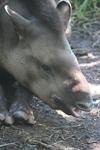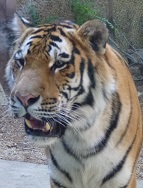 Learn more about the rewarding and fascinating field of wildlife conservation.
Learn more about the rewarding and fascinating field of wildlife conservation.
Increase your knowledge and improve your job prospects at the same time!
Covers a wide range of issues relating to wildlife conservation -
- ecological processes
- conservation of species and their habitat
- genetic diversity of small populations
- vertebrate zoology
- ecological processes
- surveying for wildlife and
- ornithology
- marine studies
THE MODULES
The course is made up of six modules.
There are four compulsory core modules -
You then choose TWO electives from -
Each module can be taken as a stand alone course.
WHAT MAKES WILDLIFE SUSCEPTIBLE?
 Wildlife is vulnerable to endangerment, decline and ultimately extinction; mainly because of human influence. However, there are a variety of other reasons and causes that can cause predispose species to extinction; these are:
Wildlife is vulnerable to endangerment, decline and ultimately extinction; mainly because of human influence. However, there are a variety of other reasons and causes that can cause predispose species to extinction; these are:
Rarity
Species can be considered “rare” if they are either:
- found in one specific type of environment or habitat
- found in only one particular area
or
- they are found at a very low density in a certain geographic location
These characteristics will depend on each species geographic extent, the size of the habitat they live in and the amount of inhabitants in that particular area. Overall, rare species are considered more vulnerable to extinction as opposed to the more commonly known ones.
Ability to Disperse
Species that move in-between their habitats are less vulnerable to become in danger of extinction than those who show limited abilities to disperse.
Degree of Specialisation
Species that adapt to only one type of environment are generally more vulnerable to extinction. This is because they are “specialised” to only one type of resource (i.e. food, weather).
Population Variability
Species that have a more stable increase or decrease on their population size are more prone to survive as opposed to those that experience large cycle fluctuations.
Trophic Level
Species occupying higher positions in the food chain will be more prone to extinction. This is because they rely on the presence of other species for food.
Life Span
Species with a longer life expectancy are more prone to survive than those with shorter lifespan. This is because those who live longer experience more environmental changes (as well as possible human impacts)
Reproductive Rate
Species that have shorter gestation periods are less susceptible to become extinct. This is because those that can reproduce at a higher rate will be more prone to survive the unexpected changes that cause their populations to clash.
WHAT NEXT?
Register to Study -Go to panel toward top of this page (right column)
or
Get Advice -Use our FREE COUNSELLING SERVICE to contact a tutor
CLICK TO CONTACT US